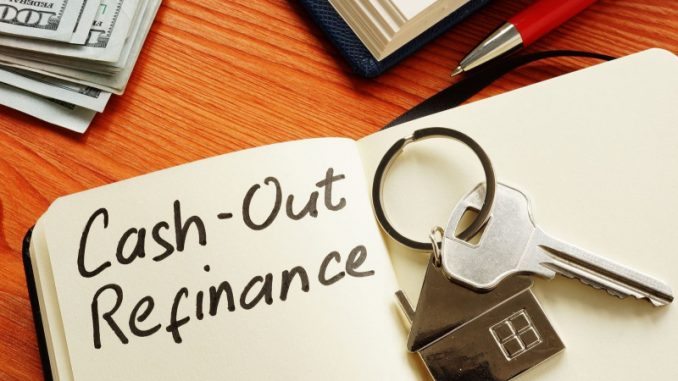
Definition and Explanation of Cash-Out Refinance Investment Property
Cash-out refinance is a financial strategy that allows property owners to tap into the equity they have built in their investment properties. By refinancing their existing mortgage, investors can obtain a new loan for an amount greater than their outstanding mortgage balance. The difference between the new loan amount and the existing mortgage is then received in cash.
Importance and Benefits of Cash-Out Refinance for Investment Properties

You might wonder why cash-out refinance is such a popular choice among real estate investors. Well, the benefits are manifold. Firstly, it provides you with access to additional funds that can be used to seize new investment opportunities, renovate your existing properties, or diversify your portfolio.
Moreover, cash-out refinance offers potential tax benefits. The interest paid on the new loan is generally tax-deductible, enabling you to reduce your taxable income and potentially save on taxes. This can be a game-changer in maximizing your returns.
Additionally, cash-out refinance allows you to leverage the equity in your investment property. As property values appreciate over time, you can tap into this increased value and utilize it for further investments. This creates a snowball effect, amplifying your overall wealth-building potential.
So, whether you’re eyeing an attractive investment opportunity or need funds for other ventures, cash-out refinance for investment properties can be a smart financial move. In the following sections, we’ll delve deeper into the mechanics, advantages, considerations, and steps involved in this process. Stay tuned to unlock the full potential of your investments!
Understanding Cash-Out Refinance

Definition and Purpose of Cash-Out Refinance
Cash-out refinance is a financial strategy that allows property owners to access the equity in their investment properties by refinancing their existing mortgage. The primary purpose of cash-out refinance is to obtain a new loan that is higher than the current mortgage balance, enabling investors to receive the difference in cash.
How Cash-Out Refinance Works for Investment Properties
When you opt for cash-out refinance, the process involves replacing your existing mortgage with a new loan. The amount you can borrow depends on the available equity in your investment property. Equity is the difference between the market value of your property and the outstanding balance on your mortgage.
For example, if your investment property is worth $500,000 and you have an outstanding mortgage balance of $300,000, you potentially have $200,000 in equity. With cash-out refinance, you can refinance your mortgage for an amount higher than $300,000, say $400,000, and receive $100,000 in cash.
Eligibility Criteria and Requirements for Cash-Out Refinance
While cash-out refinance can be an attractive option, it’s important to understand the eligibility criteria and requirements involved. Lenders typically consider factors such as your credit score, debt-to-income ratio, and the loan-to-value (LTV) ratio of your property.
A good credit score, typically above 620, demonstrates your ability to manage debt responsibly. Lenders also evaluate your debt-to-income ratio, which compares your monthly debt payments to your gross monthly income. A lower debt-to-income ratio increases your chances of qualifying for cash-out refinance.
Moreover, the loan-to-value (LTV) ratio plays a crucial role. Lenders usually have limits on the maximum LTV ratio they allow for cash-out refinance. It’s common to see LTV limits of 75% or 80%, meaning you can borrow up to that percentage of your property’s value.
By meeting these eligibility criteria and requirements, you can take advantage of cash-out refinance for your investment property. In the next section, we’ll explore the advantages of this financial strategy and how it can benefit your real estate investments.
Advantages of Cash-Out Refinance for Investment Properties

Investing in real estate requires capital, and cash-out refinance offers several advantages that can greatly benefit property owners. Let’s explore the key advantages of utilizing cash-out refinance for your investment properties.
Access to Additional Funds for Investment Purposes
One of the primary advantages of cash-out refinance is the ability to access additional funds. By refinancing your investment property, you can unlock the equity you have accumulated over time and receive a lump sum of cash. This extra capital can be used to seize new investment opportunities, expand your portfolio, or even fund renovations or repairs that enhance the value of your properties.
Potential Tax Benefits and Implications
Another significant advantage of cash-out refinance is the potential tax benefits it offers. The interest you pay on the new loan is typically tax-deductible, which can result in substantial savings. By reducing your taxable income, you can potentially lower your overall tax liability, allowing you to retain more of your investment returns. It is important to consult with a tax professional to understand the specific tax implications and ensure compliance with tax laws.
Ability to Leverage Equity in the Property
As property values increase over time, the equity in your investment property grows. Cash-out refinance allows you to leverage this equity, converting it into usable funds. By tapping into your property’s equity, you can seize new opportunities without depleting your savings or seeking external financing. This provides you with the flexibility to make strategic investment moves and capitalize on market trends.
Increased Cash Flow and ROI Potential
By accessing additional funds through cash-out refinance, you can potentially increase your property’s cash flow and overall return on investment (ROI). The injected capital can be used to make improvements, attract higher-quality tenants, or expand your rental portfolio. These enhancements can result in increased rental income, greater property appreciation, and a higher ROI over time.
In summary, cash-out refinance for investment properties offers advantages such as access to additional funds, potential tax benefits, the ability to leverage property equity, and increased cash flow and ROI potential. These benefits make cash-out refinance an attractive option for savvy real estate investors looking to optimize their investment strategies.
Considerations before Opting for Cash-Out Refinance

Before diving into a cash-out refinance for your investment property, it’s crucial to carefully evaluate various factors to ensure it aligns with your financial goals. Let’s explore some important considerations to keep in mind:
Evaluation of Current Market Conditions and Property Value
The real estate market is dynamic, and property values can fluctuate. Before proceeding with a cash-out refinance, it’s wise to assess the current market conditions and determine if property values are on the rise. A thorough evaluation of your investment property’s value will help you determine the potential equity you can tap into.
Calculating Potential Costs and Fees Involved
It’s important to be aware of the costs and fees associated with a cash-out refinance. These can include origination fees, appraisal fees, closing costs, and potentially even prepayment penalties on your existing mortgage. By calculating these expenses upfront, you can assess if the financial benefits outweigh the costs.
Assessing the Impact on Loan Terms and Interest Rates
When you opt for a cash-out refinance, you’ll be obtaining a new loan with new terms and interest rates. It’s crucial to carefully analyze these terms and rates to ensure they align with your long-term financial objectives. Consider factors such as the length of the loan, the interest rate, and any changes in monthly payments.
Understanding Potential Risks and Drawbacks
While cash-out refinancing offers numerous benefits, it’s essential to understand the potential risks and drawbacks involved. For instance, by increasing your loan amount, you’re also taking on additional debt. This means higher monthly mortgage payments and a longer repayment period. It’s crucial to assess your ability to manage these increased financial obligations.
Furthermore, there’s always a level of uncertainty in the real estate market. Property values can fluctuate, and there’s a possibility that your investment property may not appreciate as expected. This can affect your overall return on investment.
By carefully considering these factors, you can make an informed decision regarding cash-out refinance for your investment property. It’s always advisable to consult with a financial advisor or real estate professional to ensure you’re making the best choice for your specific circumstances.
Steps to Complete a Cash-Out Refinance for Investment Property

When it comes to executing a cash-out refinance for your investment property, following the right steps is crucial. Let’s explore the key stages involved in this process to ensure a smooth experience.
Preparing the Property and Necessary Documentation
Before diving into the cash-out refinance journey, take the time to prepare your investment property. Conduct a thorough assessment to ensure the property is in good condition and meets the lender’s requirements. This may involve necessary repairs or renovations to maximize its value.
Alongside property preparation, gather the essential documentation that lenders typically require. This may include income statements, tax returns, bank statements, and proof of ownership. Being well-prepared with these documents will expedite the application process.
Finding the Right Lender and Loan Options
Next, it’s crucial to find a reputable lender who understands the intricacies of cash-out refinance for investment properties. Do your research, compare rates, and assess the lender’s expertise in this specific area. Look for lenders experienced in working with real estate investors to ensure a seamless experience.
Additionally, explore different loan options available to you. Compare interest rates, loan terms, and any potential fees associated with each option. Understand the implications of each choice to make an informed decision that aligns with your investment goals.
Application Process and Approval Requirements
Once you’ve selected a lender and loan option, it’s time to initiate the application process. Complete the necessary paperwork and submit it to the lender along with the required documentation. Be prepared to provide information about your investment property, your financial situation, and your investment strategy.
The lender will evaluate your application and may request additional documentation or clarification. They will assess factors such as your creditworthiness, debt-to-income ratio, and the value of your investment property. Meeting the lender’s approval requirements is essential to move forward with the cash-out refinance.
Closing the Cash-Out Refinance
If your application is approved, congratulations! You’re almost there. The final step is the closing process, where the new loan is funded, and the existing mortgage is paid off. During this stage, you’ll sign the necessary paperwork and pay any closing costs associated with the refinance.
Once the closing process is complete, you’ll receive the cash difference between the new loan amount and the remaining mortgage balance. These funds can then be utilized for your investment plans, helping you achieve your financial goals.
By following these steps diligently, you can navigate the cash-out refinance process smoothly and unlock the potential of your investment property.
Conclusion

In conclusion, cash-out refinance for investment properties is a powerful tool that allows you to unlock the potential of your real estate investments. By refinancing your existing mortgage and accessing the built-up equity, you can secure additional funds to fuel your next big venture.
Through cash-out refinance, you can enjoy a multitude of benefits. Not only does it provide you with the necessary capital to seize new investment opportunities and diversify your portfolio, but it also offers potential tax advantages. The ability to deduct the interest paid on the new loan can significantly reduce your taxable income, generating savings that can be reinvested for further growth.
Furthermore, cash-out refinance allows you to leverage the increased value of your investment properties. As property values appreciate over time, you can tap into this equity, amplifying your overall wealth-building potential.
When considering cash-out refinance, it’s crucial to evaluate the current market conditions, assess potential costs and fees, and understand the impact on loan terms and interest rates. By carefully navigating these considerations, you can make informed decisions and optimize the benefits of cash-out refinance for your investment properties.
In conclusion, if you’re looking to fuel your real estate investments, cash-out refinance can be a game-changer. Unlock the potential of your investments and take your portfolio to new heights with this powerful financial strategy.
